SWR Television, 2.30 a.m.
The Fuchs vineyard, which has been in the family for almost 400 years, is located in southern Rheinhessen. The 72-year-old winegrower Hans-Jakob Fuchs is already the 13th generation to run the business with his wife Hildegard. But at the moment it is unclear what will happen to their life's work, into which they have put a lot of sweat and heart and soul. Since their son is pursuing a different career, "Farmer Wanted!" is supposed to help the Fuchs couple find a successor. This is the only way to ensure the future of the family business, whose tradition dates back to 1626. Hildegard and Hans-Jakob Fuchs cultivate almost 32 hectares of vineyards in Flörsheim-Dalsheim, Rheinhessen. In the wine cellar, Hildegard and Hans-Jakob Fuchs and their employees produce 200,000 litres of wine annually. But the work is slowly getting too much for the old winemaker. Therefore, the couple is looking for successors for their life's work. Two applicants come forward one after the other: The first candidate is viticulture student Maximilian Kasper from the neighbouring village of Rüssingen. The 23-year-old is passionate about viticulture and has already gained a lot of practical experience - not only at German wineries, but also in America and Australia. On the day of the trial, Maximilian lends a hand. But is the young student up to the task of taking over a winery?
SWR Television, 3.45 p.m.
Angelina and Kilian Franzen grow grapes on a difficult but beautiful steep slope on the picturesque Moselschleife in Cochem-Zell. The winemaking couple from Bremm use a monorail rack railway that winds 500 metres up the vineyard. This is the only way they can work the steep slope. This takes three to four times as long as in flat sites. Nevertheless, they manage to bottle 90,000 bottles a year.
Bavarian Television, 9.15 a.m.
The distillation of absinthe has a long tradition. Absinthe connoisseur Antoine Générau visits various herb farmers and distilleries and has methods of production explained to him. Absinthe was banned in 1915. It was replaced by Pastis, which is now an indispensable part of southern France.
hr television, 1.45 p.m.
The financial situation of "Stickler & Stickler" is very bad. After a conversation with his fatherly friend and mentor, the great vintner Gottfried Schnell, Thomas finds new hope: much like the former manager, he decides on necessary restructuring in the business - but without informing his son and partner Paul.
Bavarian Television, 10.00 p.m.
In 1964 Andrea Wirsching was born into a traditional winery in Lower Franconia. Her father and uncle run the estate in Iphofen, which has been in the family for generations. At the age of 18, a world comes crashing down for her when her mother leaves the family. Soon she can no longer stand it at home and moves to Augsburg to study. After the death of her uncle, Andrea is asked by her father to return to the vineyard. There she begins training to become a winemaker so that she can later take over the estate. At a trade fair, however, she meets Christian, who also comes from a winery. The two fall in love, Andrea moves in with him on the Saar and they start a family. She is happy until 2003, when first her parents-in-law and then her eight-year younger brother die. The marriage also falls into crisis and breaks up. Andrea returns to Franconia for the second time. But the new start is not easy. It takes time for her to find her place on the family estate.
3sat, 5.40 p.m.
From the Dreiseenland, the train travels south to idyllic Lavaux, Switzerland's most famous wine region. The vineyard terraces there have been a UNESCO World Heritage Site since 2007. Christelle Conne's family has run a vineyard here for generations and allows the film team a look behind the scenes.
3sat, 3 .55 p.m.
Preserving nature for future generations through sustainability is what winemaker Caroline Frey has in mind. All nature lovers in the valley agree: the beautiful Rhone Valley is worth protecting.
SWR Television, 6.15 p.m.
Sunny climate, vineyards and the Palatinate Forest - this is where Bad Bergzabern is located. The small spa town in the Südliche Weinstraße district is a great place to live.
MDR Television, 2.00 p.m.
On the way through Saxon Switzerland, a boat trip in the Kirnitzsch gorge and a visit to the botanical garden in Bad Schandau are just as much on the agenda as a good glass of wine at a Pirna vintner.
SWR Television, 5.30 p.m.
The TV journey takes us along the vineyards of the Moselle to the Middle Rhine Valley, where the Hunsrück slopes steeply down to the Rhine. The journey ends at the Kaiserstuhl. Here, too, volcanic activity has created gentle low mountain ranges - and at the same time the sunniest spot in Germany, a paradise for winegrowers.
hr television, 10.10 a.m.
Thomas Stickler has serious worries: he urgently needs to buy grapes to compensate for the loss of harvest. Will he get them?
SWR Television, 10.45 a.m.
Sommelières and Sommeliérs from the Southwest meet in Koblenz at Gerhard's restaurant at the Deutsches Eck. Their big common theme: liquid pleasures. At the round table of the "Genussgesellschaft bei Gerhards" (enjoyment society at Gerhard's), there is not only beer, wine, spirits and coffee, but above all stories from the TV programme "Lebensart": stories from passionate makers, connoisseurs and trendsetters. The sommelier specialists will present individual top delicacies and evaluate them professionally.
Bavarian Television, 1.15 p.m.
Andrea Wirsching, Ilonka Scheuring and Christine Pröstler are female winegrowers who stand for wine from Franconia that can be seen - and tasted - internationally. Andrea Wirsching is the managing director and manager of Bavaria's largest private winery, the first woman in the family's 400-year history. Christine Pröstler fulfilled her dream, studied oenology at Geisenheim University, worked as a winemaker overseas - and at the same time founded a winery with her family. Ilonka Scheuring swears by sustainability and professional ethics: her passion belongs to the cultivation of ancient grape varieties on the steep slopes of Main Franconia - to preserve the ecological balance.
arte, 11.45 a.m.
In an extremely difficult to access region, on the border to Tibet, farmers have been growing wine for over a hundred years, brought by French missionaries. In the last ten years, large foreign companies have also discovered the growing region and are investing a lot of money to produce good wine throughout the Middle Kingdom. They have this goal in common with the small farmers who have joined together to form a cooperative. An extraordinary winegrowing history at the foothills of the Himalayas. Viticulture is not a novelty in this region. Ever since the arrival of Catholic missionaries about 150 years ago, local farmers have planted grapes here along with other crops. The first vines were produced in the hamlet of Cizhong. There, French missionaries began to proselytise the traditionally Buddhist population from 1865. Even today, Cizhong is 80 percent Catholic, and wine production has developed strongly.
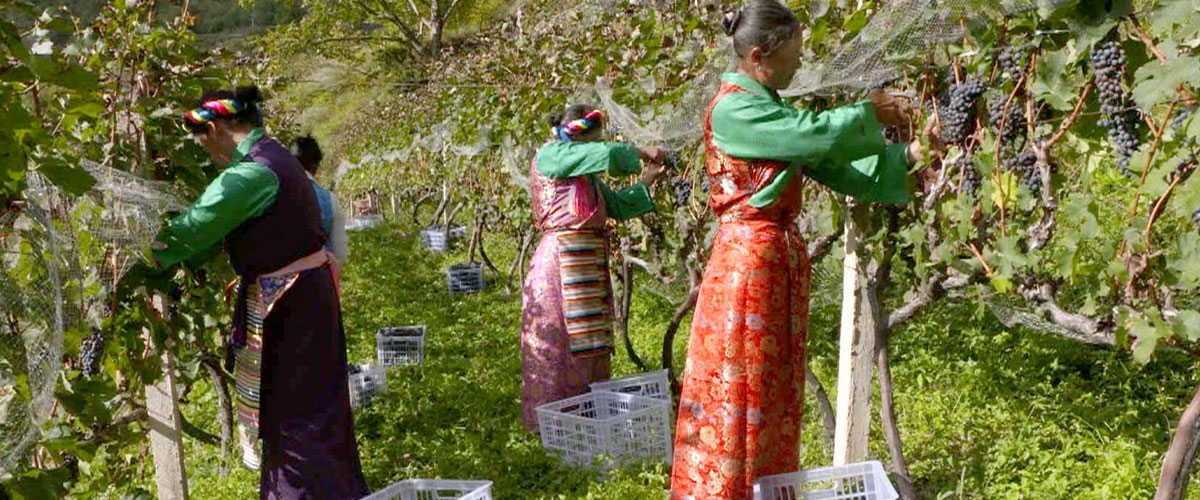 |
3sat, 3 .00 p.m.
Croatia has experienced a real boom in recent years: secluded bays, vineyards, large forests, lakes and culturally and historically valuable buildings are responsible for this.
arte, 5.20 p.m.
While wine was previously frowned upon in Indian society, it is now discreetly making its way into everyday culture. Although India does not provide a good breeding ground for viticulture from a cultural and religious point of view, there are more and more areas under cultivation in the country. Drinking wine has become chic in modern India. The trend exemplifies the change in Indian society. Some winegrowers have recognised the enormous potential and produce wine made in India. The documentary introduces some visionary winegrowers. Rajeev Samant is one of the pioneers of Indian wine culture. He brought viticulture to India and planted the country's first vineyards. With his estate Sula Vineyards, which is designed like a theme park around wine and lifestyle, he reached the production level of the world's largest winegrowers in less than 20 years. Following in the footsteps of these pioneers, the Franco-Indian Ravi Viswanathan is investing large sums in the Grover Zampa wine company. He wants to advance to the international top class with his wines.
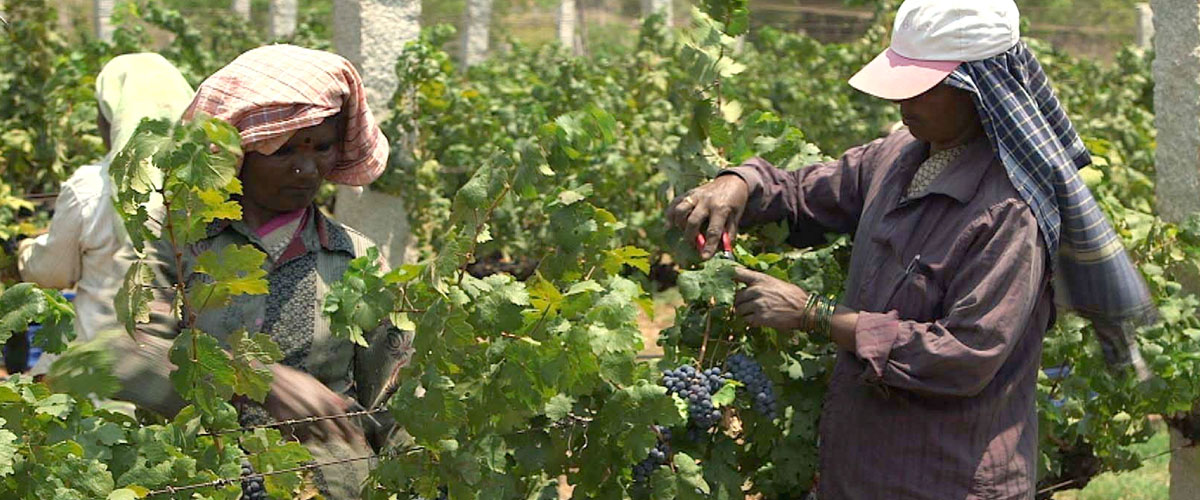 |
arte, 11.45 a.m.
Away from the tourist beaches, a new culture settled in Thailand almost 20 years ago that no one had expected: viticulture. A handful of ambitious winegrowers set out to push the envelope and adapt the vines to the hot, humid climate of the tropics. Thai viticulture is still in its infancy. But the "wines of the new latitudes" are on the rise. Thailand's three wine-growing regions are cultivated by only eight vintners. The Khao Yai region - 160 kilometres north of Bangkok - offers the most favourable conditions for wine production. At the edge of the imposing Khao Yai mountain range lies the fertile Asoke Valley with the Gran Monte domain, which belongs to the Lohitnavy family. She has set out to produce a wine that will be known beyond the borders of Thailand. The young boss of Gran Monte has brought the domain to the top of Thai wine production in a short time. In Brazil, she learned how to grow grapes under tropical conditions. 31-year-old Nikki Lohitnavy is Thailand's first and only female viticulturist and oenologist. She experimented for several years with over forty grape varieties from around the world until she found the most suitable species for tropical latitudes. Nevertheless, wine drinking remains a marginal phenomenon limited to the young, modern clientele of Bangkok's chic restaurants. Thai wine culture is still in its infancy.
arte, 15.40
Since ancient times, wine has been cultivated in the southern Croatian Adriatic region of Dalmatia - despite difficult conditions: stony soil, scorching heat and strong winds make work difficult for the winegrowers. Nevertheless, people succeeded in cultivating grape varieties that are enjoying growing popularity again today. The vineyards tell the changing story of an entire country. Almost thirty years after its foundation, the Republic of Croatia is in the process of rediscovering its wine-growing traditions and thereby also coming to terms with the past. After the disintegration of the former Yugoslavia and Croatian independence in the early 1990s, a new generation of passionate winemakers stepped up to defend their local traditions. Stone by stone, they rebuilt the huge wine terraces dug into the mountain. Grape varieties like Plavac, Grk or Posip, which fell into oblivion at the time of mass production, are now reconquering the Riviera. Croatian winegrowers are in the process of arousing new interest with old varieties.
arte, 3.35 p.m.
Desert-like landscapes as far as the eye can see, endless steppes bathed in glistening light, mountains that seem insurmountable - that is Patagonia, a wilderness at the edge of the world with the atmosphere of the Wild West. At the foothills of the Andes, despite adverse climatic conditions, a few ambitious winegrowers have begun to transform the barren earth into wine landscapes using modern methods. Near the town of General Roca, the Pinot noir grapes of the Bodega Humberto Canale thrive. Its founders, who settled there over a hundred years ago, were pioneers of viticulture in Patagonia. A little further away is the southernmost vineyard in Argentina. It belongs to the Rodríguez family, who were the first to dare to grow grapes in these latitudes.
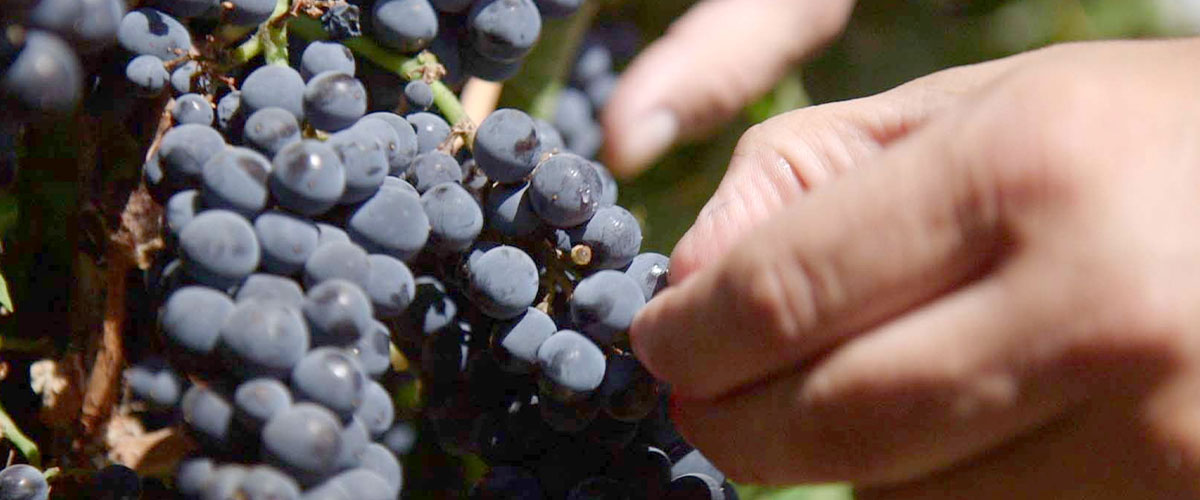 |
hr fernsehen, 2.25 p.m.
Julia Finkernagel packs her backpack again and travels to the Balkans this time. With warmth and humour, Julia meets the Montenegrin Suco, who wants to show her his country in the coming weeks. "You can do cars - but we can do ham, wine and honey," says Suco - and off we go.
hr television, 10.15 a.m.
Georg Plattner is in a coma after his heart attack. According to the doctors, Andrea cannot hope for a quick recovery. Since she cannot run the winery alone, she asks her brother Thomas for help. Together with the great vintner Schnell and Claudia's father Blasius Schmalzl, he spontaneously takes over the management of the Plattner estate. In the process, Thomas has to discover: The Hungarian winegrower recommended to him by Edina is her father David Legedy. He goes to Hungary anyway and is thrilled by the vines - it is exactly what he is missing after the frost.
arte, 11.45 a.m.
Alsace offers ideal conditions for winegrowing. The rows of vines lined up on the mountain slopes form a narrow band about a hundred kilometres long. The location at the foot of the Vosges mountains not only provides good climatic conditions, but also gives Alsace diverse soils. In a valley in the south of Alsace, the Zusslin family produces wines of international renown. The siblings Jean-Paul and Marie have taken over the estate, which has been in the family for 13 generations. On their father's initiative, it has been farmed organically since the 1970s. Even then, the winegrowers of the region made 250 hectares of land bordering the vineyard a nature reserve to preserve biodiversity. The current generation goes one step further: the young winegrowers distribute different animal and plant species among their vines. After decades of intensive farming, a great deal of biodiversity is thus returning. This benefits the wine: birds, fruit trees and various plants form a natural cycle. In Alsace, pioneering work is being done on biodynamic viticulture.
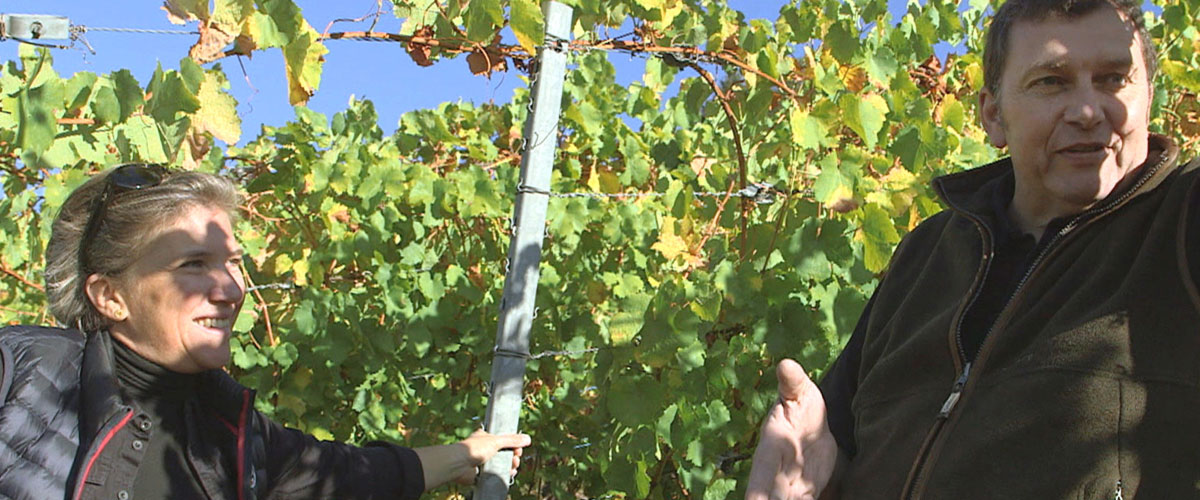 |
arte, 11.45 a.m.
For a few years now, a surprising trend has been emerging in the south of England: the forests and meadows of the hilly landscapes of Kent and Sussex are increasingly being replaced by rows of vines. The British have always been champagne lovers - now they produce their own, which is supposed to be in no way inferior to the French sparkling wine: the English Quality Sparkling Wine. It has become such a success that even the royal family is enthusiastic about producing it. The increasingly warmer temperatures and limestone soils similar to those of Champagne create ideal conditions to rival Champagne. Even Frenchmen like Pierre-Emmanuel Taittinger are getting in on the act. The champagne producer has teamed up with an Englishman and bought a 60-hectare fruit farm in Kent to turn it into a huge vineyard. The royal family also produces its own Sparkling: since its launch in 2013, the English have been clamouring for the noble drop, which is grown in the park of Windsor Castle.
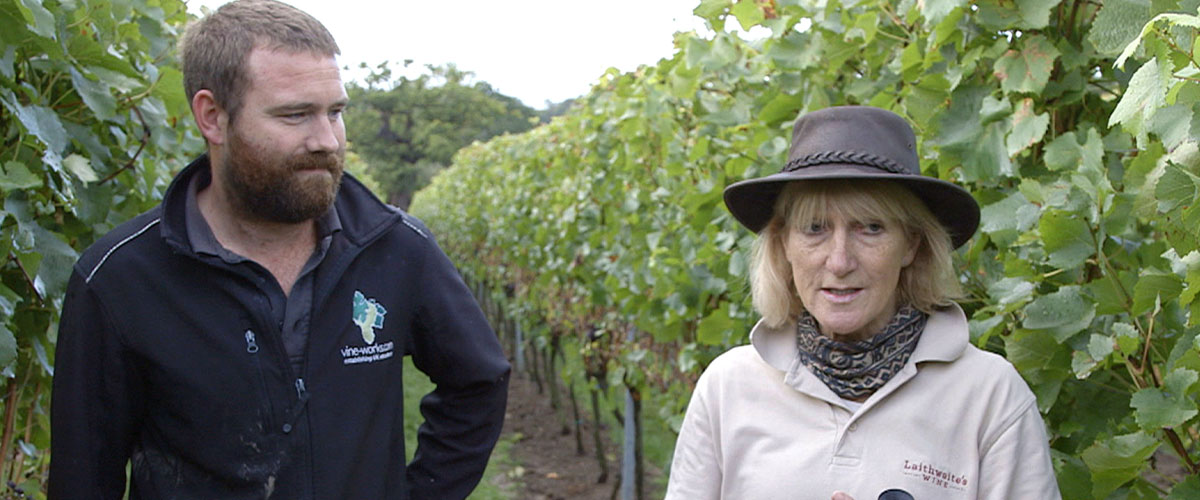 |
arte, 4.25 p.m.
Franconia is an often misunderstood wine-growing enclave in Bavaria - a region generally known for its hop fields and high brewery density. Franconia's steeply rising vineyards produce mineral-rich, powerful white wines. Today, viticulture in the region is threatened by climate change: soil erosion and drought are causing problems for the grape varieties. Vintners and scientists are joining forces to try to save Franconia's viticultural heritage. The Knoll family in Würzburg follows the principles of biodynamic cultivation to manage their vineyards in greater harmony with nature. Specialised researchers have proven for the same area that the vineyards in particularly exposed hillside locations can no longer manage without irrigation during increasingly dry periods. The young winegrower Markus Müller has joined forces with around 40 other winegrowers to build a joint irrigation system. Daniel Heßdörfer from the Bavarian State Institute for Viticulture and Horticulture has been researching tomorrow's wine, which adapts to extreme temperatures and heavy rainfall, for over 20 years. In the Institute's vineyard, he breeds old grape varieties to better withstand climate change.
arte, 6.35 p.m.
The Valtellina is one of the most beautiful and at the same time one of the lesser known Alpine regions in Italy. Enormous granite massifs, imposing mountain panoramas and nature reserves such as the glacier of the Stelvio shape its character. It is a valley that stretches for a hundred kilometres and is surrounded by steep vineyards that are painstakingly cultivated. With its dry-stone walls, declared a UNESCO World Heritage Site, Valtellina is a region of traditions and contrasts in the midst of a breathtaking landscape.
arte, 11.45 a.m.
At the foot of the Pyrenees, on the border between the Basque Country and Navarre, lies Spain's most famous wine-growing region: Rioja. Shaded by the Cantabrian Mountains, vines were planted in the valleys of the Ebro and Oja rivers as early as the Middle Ages. But Rioja experienced its heyday in the 19th century. At that time, phylloxera ravaged France's vineyards - and Spanish wines were suddenly in great demand. Since then, the focus has been more on mass production: today, Spain has the largest vineyards in the world. But a handful of dedicated winemakers in Rioja are striving to preserve the old traditions and artisanal methods.
SWR Television, 8.15 p.m.
The Tauber Valley is not only a destination for hikers and cyclists, but also for wine lovers. Then here you can find wine from three German wine-growing regions - Franconia, Baden and Württemberg. Presenter Annette Krause first visits the Wille winery, which is run by women. One of them, Michaela Wille, is the Tauber Valley Wine Queen, her sister Christina the Wine Princess. Together with her mother and sisters, they run the shop. Without a doubt, the most interesting wine from the Tauber Valley is Tauberschwarz - because it is only allowed to be grown here in this region. The grape variety had fallen into oblivion when it was rediscovered and replanted about 50 years ago. Matthias Balbach remembers how his grandfather once became a Tauberschwarz pioneer and how time-consuming it is to keep this grape variety alive. The small village of Auernhofen is home to two well-known vintners who grow their wines in the Tauber Valley. Christian Stahl, who caused quite a stir with his wine titles: whether "Narcotics", "Cold turkey" or "U-Haft", all were sold out in no time. Most of the bottles are said to have been ordered by the police and the public prosecutor's office. He is the chef of his own restaurant, where the wines do not follow the food as usual, but vice versa. His immediate neighbour, Stephan Krämer, is a talking point in a different way: his wines are organic, his production methods uncompromising. He calls himself a natural winegrower. While his products cause controversy in his home country, they are selling like hot cakes in the USA, Sweden and Japan.
arte, 10.50 a.m.
Alsace offers ideal conditions for winegrowing. The rows of vines lined up on the mountain slopes form a narrow band about a hundred kilometres long. The location at the foot of the Vosges mountains not only provides good climatic conditions, but also gives Alsace diverse soils. In a valley in the south of Alsace, the Zusslin family produces wines of international renown. The siblings Jean-Paul and Marie have taken over the estate, which has been in the family for 13 generations. On their father's initiative, it has been farmed organically since the 1970s. Even then, the winegrowers of the region made 250 hectares of land bordering the vineyard a nature reserve to preserve biodiversity. The current generation goes one step further: the young winegrowers distribute different animal and plant species among their vines. After decades of intensive farming, a great deal of biodiversity is thus returning. This benefits the wine: birds, fruit trees and various plants form a natural cycle. In Alsace, pioneering work is being done on biodynamic viticulture.
SWR Television, 5.00 p.m.
One of the highlights of the programme is a visit to the underground wine cellars of Bailly.
arte, 7.30 a.m.
Andreas Korn goes in search of places where people have conquered a piece of Europe with creative ideas and thus opened up a piece of "new territory". So they still exist, the places and living spaces where young people can realise ideas and dreams. For decades, the Pfneisl family of winegrowers could only see the former vineyards of their ancestors in Hungary. Until the Iron Curtain fell, they could only grow wine in Austria. Today the family owns vineyards on both sides of the border. Andreas Korn visits the winegrowing dynasty in the midst of busy harvesting operations.
hr fernsehen, 10.10 a.m.
The workload for Thomas and Paul continues to increase: In addition to their own business, they have to take care of Georg Plattner's vineyards.
SWR Television, 3.45 p.m.
In the Rheingau, too, residents - and especially the winegrowers - have to face new challenges. These include dealing with the clearly noticeable "climate change" as well as the search for modern forms of production and marketing. And of course, the Rheingau and its wine have also become a bit "multicultural" and globalised. The Neher family, who have run the Mohr winery in Lorch for years, work ecologically and have been in the "Ecovin" association since 2014. Jochen Neher, whose vineyards were partly farmed by his great-grandfather and who also owns the oldest vineyard in the Rheingau, shows the dramatic frost damage left by a cold snap in spring 2017. While about one in ten of the Riesling vines is damaged, there will be almost a total loss of Muskateller this year. Still in early summer, Neher hopes for a second budbreak, which will not come. Mrs Neher was born in Turkey and came to Germany when she was twenty. She has become a "real Rheingau vintner's wife" and enriches the gastronomy in Lorch with exquisite Turkish cuisine as well as cooking classes for which regular guests travel even from far away.
3sat, 4.30 pm
Georgia is nestled between the Black and Caspian Seas, between the Greater and Lesser Caucasus. The film portrays the everyday life of the people living there. Everywhere, Georgians demonstrate their hospitality, cooking skills and drinking habits. In the region of Kakheti, wine is still pressed in huge clay pots, the kvevris.
arte, 5.50 p.m.
Delaware is known as a tax haven, but its coast also grows excellent wines. Peggy Raley started with just a few vines and still had to make sure that wine growing was legalised in the Puritan state.
arte, 11.45 a.m.
Tuscany, famous for its sun-drenched landscapes with vineyards and olive groves, has always been considered one of Italy's most important wine regions. At its centre lies the Chianti region, which looks back on a centuries-old wine-growing tradition. Barons and Marchesi not only cultivate the old traditions in their castles, but also try to reinvent themselves at the same time. Baron Francesco Ricasoli runs a renowned 1,200-hectare estate of olive trees and vines in the Chianti Classico region.If Chianti is the most widely produced Italian wine in the world today, it is testimony to a region's ability to reinvent itself - also by preserving old traditions.
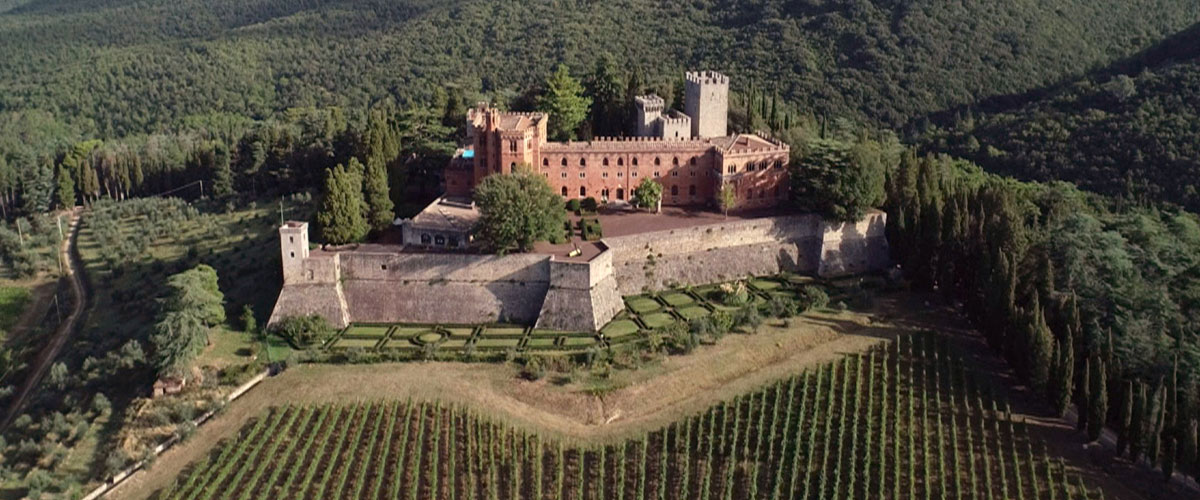 |
arte, 15.10
Towards the east along the coast lie the five Ligurian jewels - the Cinque Terre. The camera team travels with Silvia Olivari, ranger of the Cinque Terre National Park, through this unique environment. Just behind the sea, endless olive and wine terraces stretch up the mountains, "Liguria's cathedrals" they are called.
arte, 15.55
The camera team goes on a discovery tour with archaeologist Marta Coccoluto. Bolgheri, the small village on the Etruscan coast, lies immersed in a landscape of vineyards and olive groves. Through a red brick castle you enter the village with its cobbled streets and old stone houses decorated with geraniums. In the past, tulips were grown in Bolgheri, but today viticulture is flourishing. Raffaella Rotunno, an employee of a winery, gives an insight into her work. Further south along the Tyrrhenian coast lies the so-called wild west of Tuscany: the Maremma, the most unspoilt part of the region.
hr television, 10.15 a.m.
With big plans for the future, "Winzerkönig" Thomas Stickler returns to Rust after a one-year stay abroad: He finally wants to officially seal his love for Claudia Plattner, build a house together and further expand the business Stickler & Stickler with son Paul. But the first setbacks are not long in coming... The third season with 13 new episodes about the "Winzerkönig" and his family promise exciting, but also dramatic times in the first programme. Harald Krassnitzer will continue the fight for the preservation of the family business as winegrower Thomas Stickler and give the supposed winegrower idyll on Lake Neusiedl a very special character.
arte, 4.00
Away from the tourist beaches, a new culture settled in Thailand almost 20 years ago that no one had expected: viticulture. A handful of ambitious winemakers set out to push the envelope and adapt the vines to the hot, humid climate of the tropics. Thai viticulture is still in its infancy. But the "wines of the new latitudes" are on the rise. Thailand's three wine-growing regions are cultivated by only eight vintners. The Khao Yai region - 160 kilometres north of Bangkok - offers the most favourable conditions for wine production. At the edge of the imposing Khao Yai mountain range lies the fertile Asoke Valley with the Gran Monte domain, which belongs to the Lohitnavy family. She has set out to produce a wine that will be known beyond the borders of Thailand. The young boss of Gran Monte has brought the domain to the top of Thai wine production in a short time. In Brazil, she learned how to grow grapes under tropical conditions. 31-year-old Nikki Lohitnavy is Thailand's first and only female viticulturist and oenologist. She experimented for several years with over forty grape varieties from around the world until she found the most suitable species for tropical latitudes. Nevertheless, wine drinking remains a marginal phenomenon limited to the young, modern clientele of Bangkok's chic restaurants. Thai wine culture is still in its infancy.